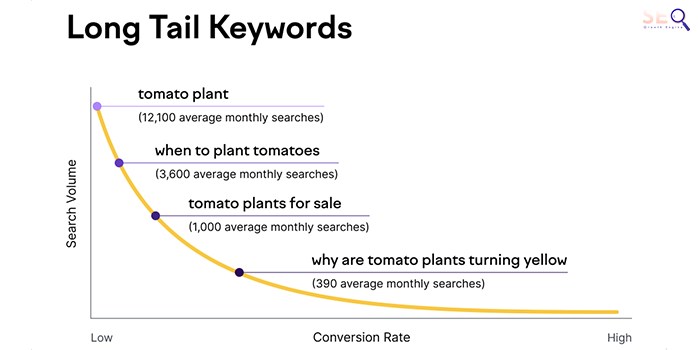Do you assume that keywords with no search volume are irrelevant? Do you feel that nobody is looking for them?
However, it’s vital to understand that just because a keyword has no search volume now doesn’t mean it’s completely useless.
People may be using different variations of the same keyword to look for the same thing.
Also, a keyword with no search volume could become popular.
Moreover, Focusing On Less Popular, Niche Keywords With High Intent Could Help You:
- Attract a more targeted audience, leading to better conversion rates.
- Boost your chances of being discovered by potential customers and gain an edge over their competitors.
- To rank higher and dominate the search space (since there is less competition for these keywords, it’s easier for businesses).
Keep an open mind and explore all possibilities when performing keyword research to optimize your content.
However, not all keywords with no search volume are worth targeting. Make sure you know the right way to perform keyword research.
We created this article to help you discover zero-search volume keywords that can bring in significant untapped traffic.
So, if you’re interested in effectively targeting these overlooked keywords, keep reading!
What Are Zero Search Volume Keywords?

Although zero search volume keywords can seem like a roadblock to successful SEO campaigns, it only sometimes signifies a lack of interest in the topic.
A search query may show zero search volume because the relevant SEO tools still need to gather more data, particularly if the keyword is relatively new.
However, with the right research strategy, savvy marketers can use zero search volume keywords to create successful SEO campaigns.
You may encounter keywords with zero search volume if you’re running an online business. These search terms have yet to be looked up within a particular time frame.
For instance, you might be running an online clothing store specializing in vintage denim jackets, and the keyword “vintage denim jackets” shows zero search volume when you use a keyword research tool.
But before you abandon such keywords, you should know there’s more to the story. Try targeting longer, more specific keyword variations or long-tail keywords.
For example, “Leather shoes under 200 dollars” might have zero search volume. Still, it is valuable in attracting a more focused audience that is more likely to convert.
Optimizing your content for these long-tail keywords with high intent, even if they have no search volume, can improve your website’s ranking on search engine results pages (SERPs) and bring in more relevant traffic.
So, don’t ignore zero-volume keywords altogether – there’s still a chance they could work wonders for your online business.
You May Like To Read This: Spam Clicking – A Definitive Guide
Why Do Zero Volume Keywords Matter?
So, you probably need to find out if it’s even worth your time to focus on keywords nobody searches for. You may be worried that it’ll take away from your efforts to rank for the popular, high-volume keywords.
Here’s the good news: targeting zero search volume keywords won’t hurt your existing SEO strategy, and it can bring you many benefits. Here is why you must perform zero volume Keyword Research.
1. Tap Into New Search Trends

Large and established websites have many high-quality backlinks, which makes it challenging for small companies and startups to compete with them in search rankings. But keep hope!
You can still find new and upcoming keywords in your niche and be the first one to target them.
Even if these trending keywords show zero search volume, they will soon gain popularity.
When you optimize your content for them, you’ll get a head start and beat the competition.
As search volumes increase, your website will stand out for having the best content and optimization because you targeted these keywords before they became popular.
Understanding your niche is key to finding keywords that could trend.
If you’re an expert in your field and keep tabs on the latest news, you can predict what people will search for shortly.
For instance, if you’re in the tech industry and know about an upcoming gadget release, targeting related long-tail keywords is smart.
Social media is also a valuable resource for spotting trends, as you can search for popular hashtags on Twitter and Instagram to see what people are interested in.
Another tool at your disposal is Google Trends. You can use it to test potential keywords and see if they’re on the verge of becoming popular. Once you’ve optimized your content for these keywords, monitor their performance in Google Trends to track any spikes in popularity. I
If you see a surge, then your approach is working! If not, you may need to tweak your strategy and find a more effective keyword.
By staying ahead of the trend and getting your page indexed and ranked by Google early on, you’ll increase your chances of driving traffic to your site.
2. Target The Right Audience

Regarding keywords with zero search volume, they are very specific and targeted toward a particular group of people.
This means they’re super relevant to your audience, but the problem is that there needs to be more content available that addresses these queries.
But this is a great opportunity for your website to shine! By creating unique and well-thought-out content that answers these questions, you can position your site as the go-to authority on the subject.
This will boost your credibility and help you rank higher in search results.
So, when it comes to zero-volume keywords, we may have different data on how many people search for them. However, there are still ways to understand what people are looking for.
One way is to analyze the landing pages on Google and the search query itself. By looking at what’s out there, we can determine what the searcher wants to know.
Additionally, you can research your competitors to see what information they might be missing in their content.
This can allow you to provide something unique and valuable to the searcher. While you might not get a flood of traffic, the visitors you do get will be highly targeted and more likely to become paying customers.
3. Drive More Organic Traffic

Even if your website is already doing well for popular keywords, adding some lesser-known long-tail zero-search volume keywords to your strategy is worth it.
The reason is that around 15% of all Google searches are unique, and by not targeting those, you could miss out on a significant amount of traffic.
That’s why it’s smart for all companies, regardless of their current search engine success, to focus on zero search volume keywords. Unfortunately, many businesses need to pay more attention to these hyper-focused, niche-specific keywords because they’re too reliant on keyword planner tools and need to see their potential value.
When you aim to rank for keywords with zero or minimal search volume, you can attract users who are likely to come from less generic and more specific long-tail queries.
This means you can get more organic clicks and generate leads from these long-tail queries compared to focusing on high-volume keywords that your competitors are also targeting.
4. Far Less Competition

One of the biggest struggles with traditional SEO is the fierce competition out there. Even if you have top-notch content and flawless technical SEO, you can still find yourself outranked for a variety of reasons, such as:
- Competitors with more high-quality backlinks
- Local businesses that have optimized their listings better
- Industry giants like Amazon, Facebook, and Wikipedia
- Well-established pages that have held their top spot for some time
As you can see, many factors can hinder your SEO success, despite having a solid strategy.
Like we said earlier, many SEO professionals don’t pay much attention to zero volume keywords because they assume nobody is looking for them. This gives you an advantage over competitors not targeting these keywords.
With less competition for these keywords, there is a greater opportunity for you to rank well for them with original and optimized content.
4 Tips For Zero Volume Keyword Research
At this point, you understand the advantages of targeting zero search volume keywords; it’s crucial to learn how to identify and use them strategically.
Refraining from assuming every keyword with zero search volume is a valuable opportunity waiting to be exploited. So, it’s important to discern which ones are worth targeting to achieve meaningful results.
How to do keyword research? That too for zero volume keywords. Let’s dive in!
1. Conduct Detailed Keyword Research

To discover zero search volume keywords, your approach to keyword research needs to be slightly different from the traditional method.
Instead of solely relying on keyword research tools, you’ll need to search for specific long-tail keywords on Google.
If you’re searching for unanswered long-tail keywords, the “People Also Ask” section on Google’s SERPs is your go-to. With this awesome tool, you can quickly find four related long-tail queries related to your original search.
It’s the perfect way to uncover those hidden gems and discover related keywords you didn’t even know existed!
As you can see, these are all great long-tail keywords (that come with low search volume) that you can target and create content for online.
But you can utilize an even better secret weapon to get even more targeted search phrases – and it’s right at your fingertips.
Google’s Autocomplete feature is an absolute gold mine of real search terms people use to find information online. So if you want to generate even more keyword ideas, this is the way to go!
All you have to do is type in a few letters of a keyword into Google, and up pops several suggestions from Google’s Autocomplete capability – easy peasy! With this powerful tool, you can easily uncover the best keywords for your content – so go ahead and try it!
2. Ensure Its Relevance With Your Audience

Targeting zero search volume keywords can seem tricky (if you’re not clear about what you’re doing); however, understanding the concept of relevancy is key.
When searching online, relevancy is king – the goal is to find the best page for the most relevant subject as quickly and efficiently as possible.
However, the challenge with zero search volume keywords is that no data is available to assess the relevance of the keyword, making it difficult to determine success.
If you want to beat your competition with your SEO efforts, then you will want to know which keywords are about to become popular and will be used more often. So while doing your keyword research, you’ll need to do some detective work.
It helps to know your target audience’s interests so you can spot the signs of a keyword that’s about to skyrocket in popularity.
So, it’s time to become best friends with your niche’s Twitter, Reddit, forums, and Facebook groups.
Keep an eye out for the keywords you’d like to target in the conversations and articles shared within these communities.
If you notice the keyword popping up, it’s about to become a popular search term.
3. Focus On Keywords That Have Commercial Intent

What do you mean by commercial intent? When a user is looking to buy a product or wants to educate themselves before purchasing something, it is said to be a commercial intent.
They are highly effective in boosting your online sales.
Commercial intent keywords are search terms that indicate a person is looking to purchase a product or service.
For instance, if someone types in a “brown leather jacket for women,” it’s a sign that they’re likely in the market to buy a new pair of running shoes.
By targeting these keywords in your content, you can increase the likelihood of reaching people who are already interested in making a purchase. This can translate to higher conversion rates and increased revenue.
One way to identify commercial intent keywords is to use Google’s Keyword Planner tool. This tool allows you to search for keywords related to your product or service and provides data on their search volume and competition level.
When doing keyword research through any tool, consider keywords with low competition and high volume. These keywords have the most potential to drive traffic to your site and convert visitors into customers.
Another way to identify commercial intent keywords is to pay attention to people’s language when searching for your product or service. Look for words like “buy,” “order,” “purchase,” or “best deals.” These words indicate that the person is looking to make a purchase and are more likely to convert into a paying customer.
Once you’ve identified commercial intent keywords, creating high-quality content targeting those keywords is important.
4. Add Strong Supporting Keywords (LSI)

Including latent semantic indexing (LSI) keywords in your main keyword is an easy way to get extra search engine visibility.
These keywords are closely related to the keyword you’re targeting and can help you rank for related keywords that often have a much lower level of competition.
The traffic boost that comes from using these associated keywords can be outstanding; it’s possible to increase your overall traffic tenfold simply by adding variations on the original keyword.
These keywords are critical for any successful SEO strategy. They often take the form of questions, such as those you’ll find in Google’s People Also Ask section.
Answering these questions in your content can give you a major boost in search engine visibility, as it increases the likelihood of your content appearing in the search engine results for those queries.
Investing time and effort into understanding and implementing keyword research into your content is essential for gaining a significant advantage in the race for search engine real estate.
Final Takeaway
If your SEO efforts have left you feeling frustrated, it could mean that you’re trying to target keywords that are way too competitive – and, unfortunately, it’s a common mistake.
Try something different, and you may be pleasantly surprised at your results.
This is why we have created this article that has already given you ideas about Zero Volume Keyword Research.
Invest time into comprehensive research and look for commercial intent keywords.
You’ll be surprised what zero search volume keywords can do for your business!
However, if you need more resources or personnel to seo keyword research, remember that plenty of SEO services can help you out.
Read Also:








